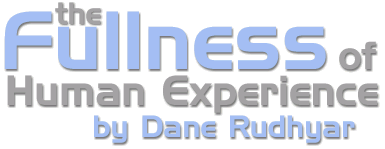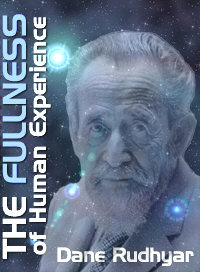 |
| Home | Bio | Art | Music | Literature | Civilization & Culture | Philosophy of Wholeness | Theosophy & Spirituality | Astrology |

CHAPTER EIGHT
Crises of Transition - 6 The process of individualization What emerges from a material womb is a biological organism of the homo sapiens variety, requiring for its survival to be fed and cared for. Even though it differs in outer features, biological temperament, and molecular chemistry from other newborns having a similar genetic ancestry, it cannot be called "an individual" in the common sense of the term. Nevertheless it has the potentiality to develop individuality within the psychic matrix of family environment and culture. From the point of view already established in this book, this "individuality" is the type of personhood which has the inherent possibility of successfully meeting and neutralizing the karma (or unconscious memory) of past failures. It is the dharma for the fulfillment of which the newborn human organism was formed and is now growing in a particular milieu. This milieu is basically the very kind of environment which will make the dharma fulfillment possible. Such a possibility, however, may entail many difficulties and much suffering, through which the karma will take concrete experiential forms. As the person is born who sooner or later will have to meet and interact with the karmic residua of the past, the birth-situation brings together three basic factors: 1. A family environment and its culture, way of life, and religious beliefs focused by the character of mother, father, and other participants, animate or inanimate. This environment is structured by the collective values of the culture and the social class and wealth of the parents, but it is also affected by their biological temperament and personal character. This family environment imposes upon the growing infant's organism numerous constraints considered essential to a successful process of growth. 2. The infant organism nevertheless operates instinctively according to the biological rhythms of its functions. These rhythms in many ways conflict with the patterns which the culture and the family-group believe to be correct procedures in the baby's upbringing. "Something" in the baby develops as the result of such a conflict This something, the ego, is formed as a means to adjust as effectively as possible the biological impulses of the infant to the demands of the family environment and the culture prevailing at the time and in the circumstances of the birth. 3. This process of ego-formation is possible and takes on a special consciousness-engendering character in a human baby because it is a member of homo sapiens. Such a life-species could appear in the biosphere because the symbolic Noon phase of the great cycle of being had been transcended, and the influence of the principle of Unity was slowly ascending. It was made possible by the concrete Presence of the Supreme Person as a new factor within the Earth-being. Dimly as it is felt in the depth of human beings, this Presence catalyzes an unconscious urge to rise from the biological level to that of the Pleroma, through the trials and difficulties of the individual level of the state of personhood. Only in this state can the neutralization of past failure through the exercise of "free will" be performed. In primitive biologically-determined animal groupings and societies, the adaptation of a living organism to the conditions prevailing in its birth-locality is apparently compulsive and unconscious; instincts rule, unchallenged. In a human being, however, the development of conscious and deliberate patterns of adjustment to family and sociocultural constraints is not only possible, but almost always occurs when a particular level of the evolution of culture is reached. Instinctual adaptation to the dictates of a tribal system based almost exclusively at first on survival and self-reproduction is replaced by conscious ego-determined behavior. At the ego level, biological temperament becomes personal character. This character is a compromise between biology and culture. It defines a particular way of being a person in a sociocultural environment. What was at first a mostly collective type of personhood, subservient to the taboos and way of thinking-feeling and behaving of the culture, becomes an individualized type of personhood through the operation of an ego. The formation and activity of an ego is inevitable. But the ego-forming process may be overpowered by the principles of organization, customs, and laws of the society, and by the development of a binding power, the collective psychism of the tribe. It may be over-powered by dominant and possessive parents or associates. On the other hand, the ego may develop in an atmosphere of conflict and violence when it strenuously resists the pressure of family, religion, and culture. Then, refusing to adapt and compromise, it finds specific ways of proving itself different and unique. A person controlled by a strong ego acts, thinks, and feels as an "in-dividual" because this ego is able to mobilize and control the psychic and even biological energies of human nature in an "un-divided" manner. The individualized ego-controlled person in most instances still operates within his or her native culture, but has emerged from the psychic matrix of family and culture as a relatively independent "individual self." The basic issue, however, is the conscious purpose and the quality of this emergence. What gave it the character it has taken? How will the by-products of the separation from the family and cultural matrix, and perhaps the embittered or lonely isolation from the natural and natal environment, be handled? Where will this new feeling-realization of being radically different from the more or less rigidly organized masses lead? During a period of cultural disintegration, what will result from the alienation of the person eager for spiritual transformation from the free-for-all struggles of egos seemingly eager to destroy any natural patterns of order and relatedness so as to prove their freedom and power? Is this feeling of "being different" to be considered the means to demonstrate the superiority of a free and perhaps creative individual — the man of power, the woman star, idol of the masses, the revered genius or inventor, and in general whoever demonstrates the triumph of the human will over nature — or is this process of individualization and overcoming of bondage to both biological compulsion and socio-cultural imperatives only a transitory phase in human evolution whose aim is to produce the conditions necessary for the neutralization of karma and to lead to a still more basic kind of emergence? And, if the latter, what kind of emergence? It should be that of a karma-free being — one among thousands of other components, ready to participate in the activity and consciousness of a super-individual and super-physical whole, the Pleroma, the Soul of the Earth-being. The process of individualization begins in the formation of the ego, but the patterns of the ego (its modus operandi) are still basically conditioned by the demands and constraints of the culture. These, however, establish a frame of reference — and symbolically speaking, a psychic womb — necessary to define the potential structure of the individual-in-the-making. A mason builds a physical structure, as it were, against gravity; individuality takes the form it needs to take against the pressure of the collectivity, because the particular collective culture in which the human being is born provides optimum conditions for the reawakening of the memories of past failures through sociocultural situations making possible the solution of the karmic problem. Personhood, I repeat, is the overall Solution envisioned by the Godhead in the Midnight phase of the cycle; but this Solution has an immense number of aspects because the components of a person's humanity had failed in an equally immense variety of ways. The family environment and the culture in which a person is born represent the person's ancient past in its essential or symbolic form insofar as this past included karma-engendering sins of omission or commission. Individuality takes form against this karmic pressure. If the mind of the individual-in-the-making can understand and accept the situation, and if his or her desires (the subjective factor in the experiences being evoked by the life-situation) do not cling to old biological patterns, the karmic darkness can be transformed into Light — the light of accepted meaning. When the purpose of passing through the state of personhood is revealed and assimilated, a further period of the evolutionary process opens up. The principle of Unity has become more powerful, nearly equaling in intensity the principle of Multiplicity. The latter has been retreating inward, but its inertial strength is sufficient to affect weak or desperate persons. The conscious and deliberate movement toward the radiant Pleroma state may find its shadow counter-part in several ways: in an utterly weary falling by the wayside, in an escape into a subjective dream state, or in the noxious disintegration either of persons who would not dare to be individuals, or of individuals whose desires and minds could not meet crucial situations except in terms of personal fulfillment in a culture or of individual separateness. The process of individualization is an emergence out of the state of unquestioned subservience to the paradigms and religious beliefs of the society in which one is born and where personhood has developed. While the first stage of the process is the formation of an ego, a further step leads to a contact with the dharma that defines the purpose of the birth. I have spoken so far of this dharma mostly as the means to neutralize the karma of the past. But beyond this process of neutralization, the consciousness of the individual struggling through the process of liberation may already have an intuitive sense of the place and function he or she will fulfill in the next transcendent and planetary state of the Pleroma — provided that the "spiritual Quality"(3) vibrating at the innermost core of his or her personhood succeeds in drawing and attaching to itself the so often vacillating desire and will of the individual on "the Path." As this occurs, the individual is not lost but operates within a new frame of reference which includes the whole of humanity and the Earth-being of which it is a part. Personhood — in the strict sense of the term — vanishes, having served its purpose as a means to solve the karmic problem. Then at "the end of time" the prototype of personhood, the Supreme Person, is released — or perhaps it is absorbed into the many individuals who have successfully passed through the often tragic rite of passage beyond personhood. The theosophical tradition speaks of that end of time as "the Great Day Be With Us." On that Day, unanimity and individuality interpenetrate and combine into the Pleroma state of being. Unity and Multiplicity are balanced, and a new level of beingness begins at which the subjectivity factor increasingly dominates the experiences which metacosmic situations now provide. 3. Rhythm of Wholeness, chapter Five, page 97, for a definition of spiritual Quality. Return By permission of Leyla Rudhyar Hill Copyright © 1986 by Leyla Rudhyar Hill All Rights Reserved.  Web design and all data, text and graphics appearing on this site are protected by US and International Copyright and are not to be reproduced, distributed, circulated, offered for sale, or given away, in any form, by any means, electronic or conventional. See Notices for full copyright statement and conditions of use. Web design copyright © 2000-2004 by Michael R. Meyer. All Rights Reserved. |
 |
